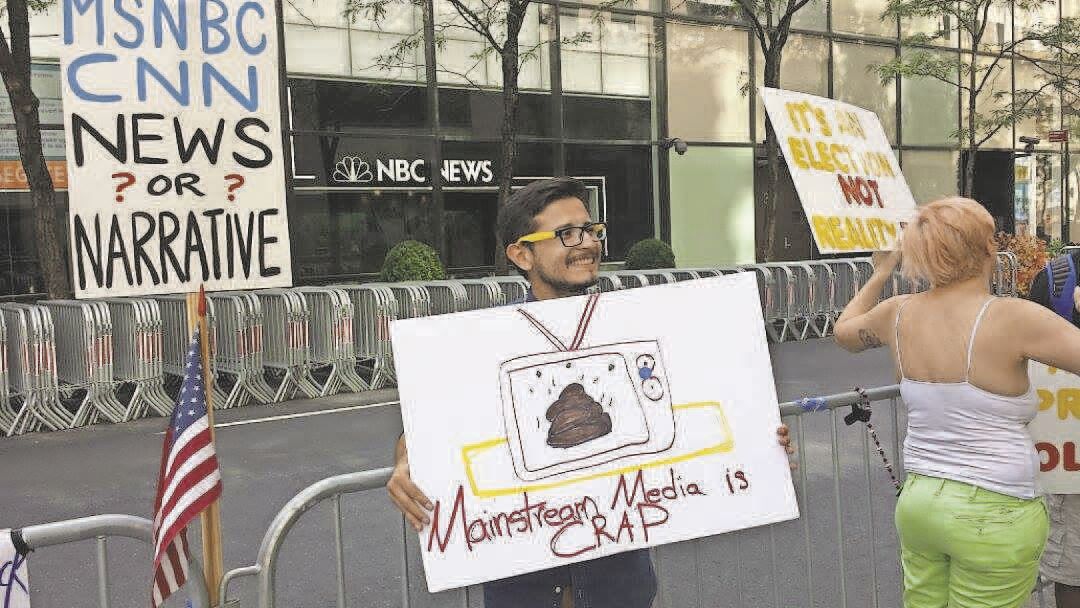By Andrew Martins, Managing Editor
Armed with placards with slogans like “CNN = Clinton News Network” and “It’s an election, not reality TV,” more than 200 dissatisfied people took to the streets of Manhattan to air their grievances with the mainstream media.
The group, which ran the range of disenfranchised Bernie Sanders supporters to local union members, stood before the headquarters of MSNBC on Saturday, Aug. 27 to demand more from their news.
And at the center of it all was Hillsborough resident and local activist, Didier Jimenez.
“This cozy relationship between journalists and politicians has to stop for the sake of a healthy democracy in America,” Mr. Jimenez said. “You need a healthy media to tell the truth to the people, rather than fool them with their own agenda.”
Prior to this year’s heated presidential campaigns, Mr. Jimenez, 28, had spent nearly a decade doing charity work for a number of non-profit organizations, including the Wildlife Conservation Society, Make-a-Wish, Autism Speaks, Partners in Caring. He was even featured on a specially marked box of Cheerios for helping ShopRite raise $1 million for hunger prevention back in 2012.
However, when the primaries began and Mr. Jimenez found he agreed with hopeful candidate Bernie Sanders more than Hillary Clinton, he turned his activism to the political hemisphere.
“I realized that all of those charities were politically connected in some kind of way,” Mr. Jimenez said. “Democracy is not a sport where you can sit on the sidelines. You have to get involved.”
When Sen. Sanders finally bowed out from the race back in July, Mr. Jimenez said he was disappointed but understanding.
It wasn’t until the hack of Democratic National Committee e-mail servers revealed an alleged attempt to make the candidate look bad through the media that the local activist took umbrage with the way things were.
“Everybody knew for years that the media has been biased, following their own political agenda and profits, but there wasn’t any proof,” he said. “When the DNC leak came out…it showed how politicians have a cozy relationship with these media outlets.”
Like many of his fellow Sanders supporters, Mr. Jimenez took particular issue with the way Florida senator and former DNC chair Debbie Wasserman-Schultz painted the Sanders campaign as a slipshod organization.
“The DNC is supposed to be a referee in all of this, but it looked like they were communicating to make sure that they’re able to push their agenda, their topics, above real journalism – which is what the American people really need,” Jimenez said.
Along with how the election has been covered, Mr. Jimenez said he and his fellow protestors wanted to alert the public to the relationship between the country’s media outlets and both political parties.
The issue of corporate ownership of the American media, which was facilitated in large part by the Telecommunications Act, signed by then President Bill Clinton in 1996, was also a major focus of the protest.
“We’re trying to wake up the public because not everybody goes online (for their news),” Mr. Jimenez said. “For example, my parents are part of the generation where they go home, turn the TV, watch an hour of news, go to sleep and go back to work…because they believe that the newscasters know what’s good for them.”
“The media is where people look for news, for journalism and what is going on outside their own little world,” he continued.
Though his candidate is no longer out of the race and Ms. Wasserman-Schultz is no longer running the Democratic Party, Mr. Jimenez said the fight for a “more unbiased news media” is not over.
“This is not just one protest and it’s over. This is not an election cycle and then everybody goes back to sleep,” he said. “Democracy is not a spectator sport – you have to get out there, push for what’s right and be consistent. It does not happen overnight.”

